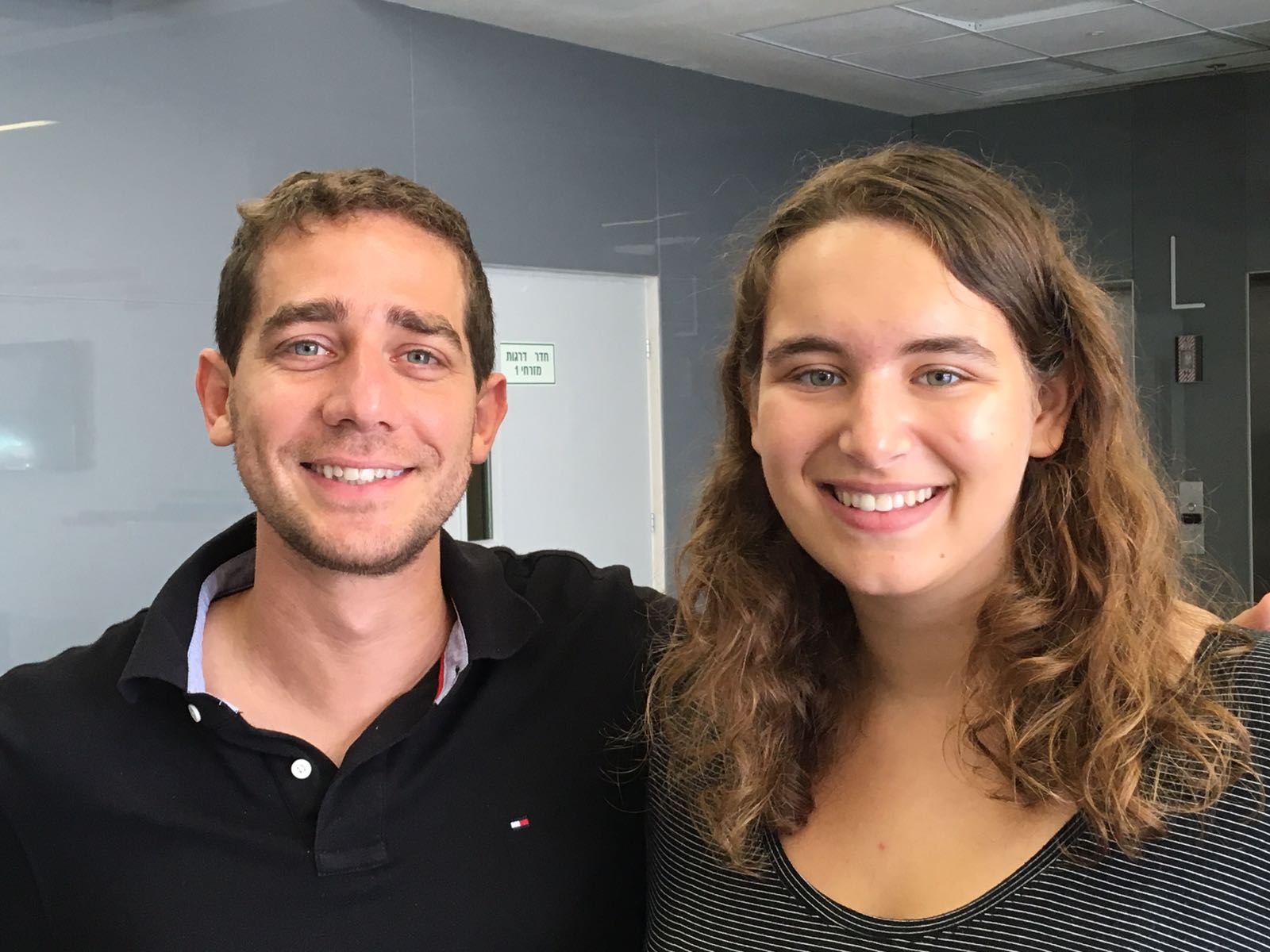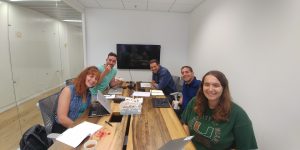How to Make the Most of a TAMID Intern
Co-Authored by Mollie Cole, U. Miami and Idan Meir, Co-Founder + CEO RightHear
Mollie served as Intern/Community & Content Manager for RightHear the summer of 2017 through TAMID Fellowship Program
Hosting a TAMID Intern? Here’s how to make the most of the experience:
TAMID interns are some of the most committed, ambitious, and eager-to-learn students on each of their respective campuses. As members of the TAMID Group chapter at their university, they work hard throughout the year to produce quality consulting and finance reports. They were carefully selected to be a part of the summer fellowship, and they are prepared to do their best at your company.
In the past, TAMID interns have led meetings with potential partners abroad, helped write national legislation, built complete mobile applications, and given presentations to top executives. If you have a student who is capable of bringing this much value to your start-up or corporation, don’t you want to be as prepared as possible to support them in doing so?
At my TAMID internship, I worked at a quickly-growing start-up called RightHear. RightHear produces an innovative solution, composed of an app, light hardware, and an online dashboard, that allows people who are blind to find their way around inside of buildings. Both RightHear and I got real value out of the summer internship experience, and here’s how you and your TAMID intern can too:
Plan in advance
No matter what stage you’re in, your company has a strategic growth plan and next-steps laid out for the future. Set aside an hour or two to do an analysis of your business, your growth, and where your TAMID intern can fit into that process. If you understand your weaknesses, or can identify a specific project that needs to be accomplished, you can use that as a starting point to create a concrete plan of what your intern will do.
Once you have an idea of what your intern could work on, create an on-paper plan. My supervisor at RightHear, Idan, created an extensive agenda with daily tasks planned for the whole summer. I could look at it and know exactly what needed to be accomplished that day, or what needed to be prioritized from later that week. Because Idan put in a few hours of work at the beginning of the summer, I was able to begin working every day without him having to explain exactly what he needed me to do. I could then check in with him as needed and send completed drafts for feedback, but overall I was able to manage my own time and work. We also met about once a week to review the tasks and rearrange the timeline as needed.
While preparing the daily agenda before I even arrived was incredibly helpful, if that’s not you and your intern’s style, prepare something a little more general. Even an outline of a project with some specific things you would like them to take care of can make your entire experience together much more efficient.
Idan’s comments (supervisor):
The word “intern” and the word “expert”, sounds very similar in the Hebrew language. At RightHear we prefer to use the second one because when the company thinks of the intern as an expert that comes to help us out – all of the expectations, from both sides of the table – change in a very positive way.
Imagine Mark Zuckerberg were about to join your team for a the summer, wouldn’t you prepare it to the maximum?
Communicate
Once you and your intern are matched in the spring, don’t stay silent until the summer. Staying in touch with your intern, even if it’s just asking them about their travel plans and summer preparations. Even better, send them updates about your company, recent press releases, or information about projects or mergers that would be happening over the summer. This helps them take a sense of ownership and pride in their work before even landing in Israel. It also helps you establish which communication channels and styles work best for you and your intern.
If your company and your intern agree that it would be appropriate, you can even start sending small tasks to your intern before summer. Be wary of their classwork, exams, and other commitments, but if they agree to do a small task here and there you will gain a better sense of their work style and how you can make adjustments to your plans.
During Spring semester, Idan sent me a few materials to proofread and send back to him. I was able to read and learn more about the company in the process, and Idan saw that it was a skill I enjoyed and he knew to give me projects and proposals to edit throughout the summer.
Idan:
It all comes to caring about each other. When the company actually cares about the intern (Is your apartment okay? Do you have everything you need?) then the intern actually cares about the success of the company in return. This post is just one small example, as the summer internship ended nearly two weeks ago.
Don’t be afraid to give “real” work
As you can see from some of the examples above, TAMID interns are highly motivated and ready to learn. Set high expectations from day 1. Once they are ready, give your intern real projects to work on that add genuine value to the company. It’s better for you, because you essentially get free, high-quality work, and it’s better for your intern because they can develop real-world skills and take pride in their work.
Give your student a week or so to learn about your company’s day-to-day operations and get used to life in Israel, and then don’t be afraid to throw them into the action. As long as you, or a fellow employee is checking in with them to make sure they understand what’s expected and they have the proper resources, TAMID students can do equal quality work to any employee.
At RightHear, I spent the first week preparing a slide deck and then gave a mock pitch to Idan. He mentored me through the project, helped me develop a better understanding of the company, and afterwards I was much more confident talking and writing about RightHear. By the end of the summer, I had launched their first company blog. In between, I wrote press releases, managed their social media outlets, worked on guest posts with top industry bloggers, and even made recommendations about how and when to release content. I got real experience in a digital marketing role, and RightHear got real, tangible output to build on for months or even years to come.
Be Flexible
As with any project, especially in the start-up ecosystem, flexibility is key. To make a successful internship experience, put in the planning, communication, and mentorship to allow your intern to do real, genuine projects. But, along the way, don’t forget that everyone in the process is constantly learning how to improve. If your intern turns in something that didn’t quite match what you were hoping for, teach them how to improve it and still maintain high expectations for the final product. If a new deadline comes up that interrupts your pre-planned agenda, just communicate to your intern how you are rearranging the schedule and why.
Many TAMID interns are also in Israel for the first time, and they get to attend TAMID programming and trips throughout the summer. Remember to be flexible about these events and any time your intern may need to travel to and from them. Be sure to take those events into account when making a plan for the summer, and keep a realistic and agreed-upon view of how many hours your intern can feasibly work.
Idan’s flexibility was one of my favorite parts of my internship. He and I were in constant communication about when to release certain content or news, and we often changed plans to match what was best for us or for the market. In addition, he was happy to let me skip the hour-long commute and work from home a few days a week. I had the chance to explore Tel Aviv’s co-working/coffee shop scene while still turning in high-quality work at the end of the day. As the summer goes along and you develop a relationship with your intern, figure out what works best for them and for you. Even if it’s not what you originally expected, flexibility in making it happen will create a better experience for both parties.
Idan:
As a startup company you should always remember that it’s not about sticking with the original plan or having everyone in the office for a certain amount of hours… but it’s about making progress. Flexibility, creativity and quality prioritization on the fly are key to making it happen.


